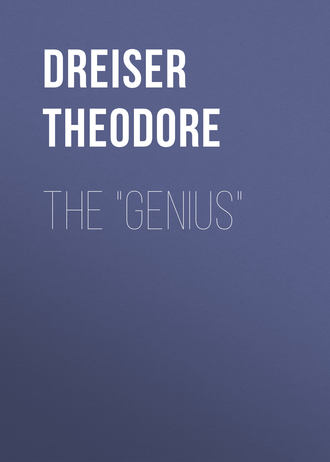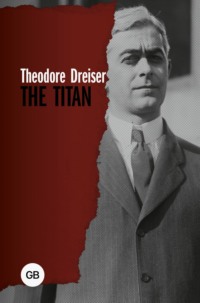 полная версия
полная версияThe "Genius"
Getting on his feet again financially was not such an easy thing. He had been out of touch now so long with things artistic – the magazine world and the art agencies – that he felt as if he might not readily be able to get in touch again. Besides he was not at all sure of himself. He had made sketches of men and things at Speonk, and of Deegan and his gang on the road, and of Carlotta and Angela, but he felt that they were weak in their import – lacking in the force and feeling which had once characterized his work. He thought of trying his hand at newspaper work if he could make any sort of a connection – working in some obscure newspaper art department until he should feel himself able to do better; but he did not feel at all confident that he could get that. His severe breakdown had made him afraid of life – made him yearn for the sympathy of a woman like Carlotta, or of a larger more hopeful, more tender attitude, and he dreaded looking for anything anywhere. Besides he hated to spare the time unless he were going to get somewhere. His work was so pressing. But he knew he must quit it. He thought about it wearily, wishing he were better placed in this world; and finally screwed up his courage to leave this work, though it was not until something else was quite safely in his hands.
CHAPTER XXX
It was only after a considerable lapse of time, when trying to live on nine dollars a week and seeing Angela struggle almost hopelessly in her determination to live on what he earned and put a little aside, that he came to his senses and made a sincere effort to find something better. During all this time he had been watching her narrowly, seeing how systematically she did all her own house work, even under these adverse and trying circumstances, cooking, cleaning, marketing. She made over her old clothes, reshaping them so that they would last longer and still look stylish. She made her own hats, doing everything in short that she could to make the money in the bank hold out until Eugene should be on his feet. She was willing that he should take money and buy himself clothes when she was not willing to spend it on herself. She was living in the hope that somehow he would reform. Consciousness of what she was worth to him might some day strike him. Still she did not feel that things could ever be quite the same again. She could never forget, and neither could he.
The affair between Eugene and Carlotta, because of the various forces that were militating against it, was now slowly drawing to a close. It had not been able to endure all the storm and stress which followed its discovery. For one thing, Carlotta's mother, without telling her husband, made him feel that he had good cause to stay about, which made it difficult for Carlotta to act. Besides she charged her daughter constantly, much as Angela was charging Eugene, with the utmost dissoluteness of character and was as constantly putting her on the defensive. She was too hedged about to risk a separate apartment, and Eugene would not accept money from her to pay for expensive indoor entertainment. She wanted to see him but she kept hoping he would get to the point where he would have a studio again and she could see him as a star in his own field. That would be so much nicer.
By degrees their once exciting engagements began to lapse, and despite his grief Eugene was not altogether sorry. To tell the truth, great physical discomfort recently had painted his romantic tendencies in a very sorry light for him. He thought he saw in a way where they were leading him. That there was no money in them was obvious. That the affairs of the world were put in the hands of those who were content to get their life's happiness out of their management, seemed quite plain. Idlers had nothing as a rule, not even the respect of their fellow men. The licentious were worn threadbare and disgraced by their ridiculous and psychologically diseased propensities. Women and men who indulged in these unbridled relations were sickly sentimentalists, as a rule, and were thrown out or ignored by all forceful society. One had to be strong, eager, determined and abstemious if wealth was to come, and then it had to be held by the same qualities. One could not relax. Otherwise one became much what he was now, a brooding sentimentalist – diseased in mind and body.
So out of love-excitement and poverty and ill health and abuse he was coming to see or thought he was this one fact clearly, – namely that he must behave himself if he truly wished to succeed. Did he want to? He could not say that. But he had to – that was the sad part of it – and since apparently he had to, he would do the best he could. It was grim but it was essential.
At this time Eugene still retained that rather ultra artistic appearance which had characterized his earlier years, but he began to suspect that on this score he was a little bizarre and out of keeping with the spirit of the times. Certain artists whom he met in times past and recently, were quite commercial in their appearance – the very successful ones – and he decided that it was because they put the emphasis upon the hard facts of life and not upon the romance connected with their work. It impressed him and he decided to do likewise, abandoning the flowing tie and the rather indiscriminate manner he had of combing his hair, and thereafter affected severe simplicity. He still wore a soft hat because he thought it became him best, but otherwise he toned himself down greatly. His work with Deegan had given him a sharp impression of what hard, earnest labor meant. Deegan was nothing but a worker. There was no romance in him. He knew nothing about romance. Picks and shovels and mortar boards and concrete forms – such was his life, and he never complained. Eugene remembered commiserating him once on having to get up at four A. M. in order to take a train which would get to work by seven. Darkness and cold made no difference to him, however.
"Shewer, I have to be theyre," he had replied with his quizzical Irish grin. "They're not payin' me me wages fer lyin' in bed. If ye were to get up that way every day fer a year it would make a man of ye!"
"Oh, no," said Eugene teasingly.
"Oh, yes," said Deegan, "it would. An' yere the wan that's needin' it. I can tell that by the cut av ye."
Eugene resented this but it stayed by him. Deegan had the habit of driving home salutary lessons in regard to work and abstemiousness without really meaning to. The two were wholly representative of him – just those two things and nothing more.
One day he went down into Printing House Square to see if he could not make up his mind to apply at one of the newspaper art departments, when he ran into Hudson Dula whom he had not seen for a long while. The latter was delighted to see him.
"Why, hello, Witla!" he exclaimed, shocked to see that he was exceptionally thin and pale. "Where have you been all these years? I'm delighted to see you. What have you been doing? Let's go over here to Hahn's and you tell me all about yourself."
"I've been sick, Dula," said Eugene frankly. "I had a severe case of nervous breakdown and I've been working on the railroad for a change. I tried all sorts of specialists, but they couldn't help me. So I decided to go to work by the day and see what that would do. I got all out of sorts with myself and I've been pretty near four years getting back. I think I am getting better, though. I'm going to knock off on the road one of these days and try my hand at painting again. I think I can do it."
"Isn't that curious," replied Dula reminiscently, "I was just thinking of you the other day and wondering where you were. You know I've quit the art director game. Truth failed and I went into the lithographic business. I have a small interest in a plant that I'm managing down in Bond Street. I wish you'd come in and see me some day."
"I certainly will," said Eugene.
"Now this nervousness of yours," said Dula, as they strolled into the restaurant where they were dining. "I have a brother-in-law that was hit that way. He's still doctoring around. I'm going to tell him about your case. You don't look so bad."
"I'm feeling much better," said Eugene. "I really am but I've had a bad spell of it. I'm going to come back in the game, though, I feel sure of it. When I do I'll know better how to take care of myself. I over-worked on that first burst of pictures."
"I must say that was the best stuff of that kind I ever saw done in this country," said Dula. "I saw both your shows, as you remember. They were splendid. What became of all those pictures?"
"Oh, some were sold and the rest are in storage," replied Eugene.
"Curious, isn't it," said Dula. "I should have thought all those things would have been purchased. They were so new and forceful in treatment. You want to pull yourself together and stay pulled. You're going to have a great future in that field."
"Oh, I don't know," replied Eugene pessimistically. "It's all right to obtain a big reputation, but you can't live on that, you know. Pictures don't sell very well over here. I have most of mine left. A grocer with one delivery wagon has the best artist that ever lived backed right off the board for financial results."
"Not quite as bad as that," said Dula smilingly. "An artist has something which a tradesman can never have – you want to remember that. His point of view is worth something. He lives in a different world spiritually. And then financially you can do well enough – you can live, and what more do you want? You're received everywhere. You have what the tradesman cannot possibly attain – distinction; and you give the world a standard of merit – you will, at least. If I had your ability I would never sit about envying any butcher or baker. Why, all the artists know you now – the good ones, anyhow. It only remains for you to do more, to obtain more. There are lots of things you can do."
"What, for instance?" asked Eugene.
"Why, ceilings, mural decorations. I was saying to someone the other day what a mistake it was the Boston Library did not assign some of their panels to you. You would make splendid things of them."
"You certainly have a world of faith in me," replied Eugene, tingling warmly. It was like a glowing fire to hear this after all the dreary days. Then the world still remembered him. He was worth while.
"Do you remember Oren Benedict – you used to know him out in Chicago, didn't you?"
"I certainly did," replied Eugene. "I worked with him."
"He's down on the World now, in charge of the art department there. He's just gone there." Then as Eugene exclaimed over the curious shifts of time, he suddenly added, "Why wouldn't that be a good idea for you? You say you're just about to knock off. Why don't you go down and do some pen work to get your hand in? It would be a good experience for you. Benedict would be glad to put you on, I'm sure."
Dula suspected that Eugene might be out of funds, and this would be an easy way for him to slip into something which would lead back to studio work. He liked Eugene. He was anxious to see him get along. It flattered him to think he had been the first to publish his work in color.
"That isn't a bad idea," said Eugene. "I was really thinking of doing something like that if I could. I'll go up and see him maybe today. It would be just the thing I need now, – a little preliminary practise. I feel rather rusty and uncertain."
"I'll call him up, if you want," said Dula generously. "I know him well. He was asking me the other day if I knew one or two exceptional men. You wait here a minute."
Eugene leaned back in his chair as Dula left. Could it be that he was going to be restored thus easily to something better? He had thought it would be so hard. Now this chance was coming to lift him out of his sufferings at the right time.
Dula came back. "He says 'Sure,'" he exclaimed. "'Come right down!' You'd better go down there this afternoon. That'll be just the thing for you. And when you are placed again, come around and see me. Where are you living?"
Eugene gave him his address.
"That's right, you're married," he added, when Eugene spoke of himself and Angela having a small place. "How is Mrs. Witla? I remember her as a very charming woman. Mrs. Dula and I have an apartment in Gramercy Place. You didn't know I had tied up, did you? Well, I have. Bring your wife and come to see us. We'll be delighted. I'll make a dinner date for you two."
Eugene was greatly pleased and elated. He knew Angela would be. They had seen nothing of artistic life lately. He hurried down to see Benedict and was greeted as an old acquaintance. They had never been very chummy but always friendly. Benedict had heard of Eugene's nervous breakdown.
"Well, I'll tell you," he said, after greeting and reminiscences were over, "I can't pay very much – fifty dollars is high here just at present, and I have just one vacancy now at twenty-five which you can have if you want to try your hand. There's a good deal of hurry up about at times, but you don't mind that. When I get things straightened out here I may have something better."
"Oh, that's all right," replied Eugene cheerfully. "I'm glad to get that." (He was very glad indeed.) "And I don't mind the hurry. It will be good for a change."
Benedict gave him a friendly handshake in farewell. He was glad to have him, for he knew what he could do.
"I don't think I can come before Monday. I have to give a few days' notice. Is that all right?"
"I could use you earlier, but Monday will do," said Benedict, and they parted genially.
Eugene hurried back home. He was delighted to tell Angela, for this would rob their condition of part of its gloom. It was no great comfort to him to be starting in as a newspaper artist again at twenty-five dollars a week, but it couldn't be helped, and it was better than nothing. At least it was putting him back on the track again. He was sure to do still better after this. He could hold this newspaper job, he felt, and outside that he didn't care very much for the time being; his pride had received some severe jolts. It was vastly better than day labor, anyway. He hurried up the four flights of stairs to the cheap little quarters they occupied, saying when he saw Angela at the gas range: "Well, I guess our railroad days are over."
"What's the trouble?" asked Angela apprehensively.
"No trouble," he replied. "I have a better job."
"What is it?"
"I'm going to be a newspaper artist for a while on the World."
"When did you find that out?" she asked, brightening, for she had been terribly depressed over their state.
"This afternoon. I'm going to work Monday. Twenty-five dollars will be some better than nine, won't it?"
Angela smiled. "It certainly will," she said, and tears of thanksgiving filled her eyes.
Eugene knew what those tears stood for. He was anxious to avoid painful reminiscences.
"Don't cry," he said. "Things are going to be much better from now on."
"Oh, I hope so, I hope so," she murmured, and he patted her head affectionately as it rested on his shoulder.
"There now. Cheer up, girlie, will you! We're going to be all right from now on."
Angela smiled through her tears. She set the table, exceedingly cheerful.
"That certainly is good news," she laughed afterward. "But we're not going to spend any more money for a long while, anyhow. We're going to save something. We don't want to get in this hole again."
"No more for mine," replied Eugene gaily, "not if I know my business," and he went into the one little combination parlor, sitting room, reception room and general room of all work, to open his evening newspaper and whistle. In his excitement he almost forgot his woes over Carlotta and the love question in general. He was going to climb again in the world and be happy with Angela. He was going to be an artist or a business man or something. Look at Hudson Dula. Owning a lithographic business and living in Gramercy Place. Could any artist he knew do that? Scarcely. He would see about this. He would think this art business over. Maybe he could be an art director or a lithographer or something. He had often thought while he was with the road that he could be a good superintendent of buildings if he could only give it time enough.
Angela, for her part, was wondering what this change really spelled for her. Would he behave now? Would he set himself to the task of climbing slowly and surely? He was getting along in life. He ought to begin to place himself securely in the world if he ever was going to. Her love was not the same as it had formerly been. It was crossed with dislike and opposition at times, but still she felt that he needed her to help him. Poor Eugene – if he only were not cursed with this weakness. Perhaps he would overcome it? So she mused.
CHAPTER XXXI
The work which Eugene undertook in connection with the art department of the World was not different from that which he had done ten years before in Chicago. It seemed no less difficult for all his experience – more so if anything, for he felt above it these days and consequently out of place. He wished at once that he could get something which would pay him commensurately with his ability. To sit down among mere boys – there were men there as old as himself and older, though, of course, he did not pay so much attention to them – was galling. He thought Benedict should have had more respect for his talent than to have offered him so little, though at the same time he was grateful for what he had received. He undertook energetically to carry out all the suggestions given him, and surprised his superior with the speed and imagination with which he developed everything. He surprised Benedict the second day with a splendid imaginative interpretation of "the Black Death," which was to accompany a Sunday newspaper article upon the modern possibilities of plagues. The latter saw at once that Eugene could probably only be retained a very little while at the figure he had given him. He had made the mistake of starting him low, thinking that Eugene's talent after so severe an illness might be at a very low ebb. He did not know, being new to the art directorship of a newspaper, how very difficult it was to get increases for those under him. An advance of ten dollars to anyone meant earnest representation and an argument with the business manager, and to double and treble the salary, which should have been done in this case, was out of the question. Six months was a reasonable length of time for anyone to wait for an increase – such was the dictate of the business management – and in Eugene's case it was ridiculous and unfair. However, being still sick and apprehensive, he was content to abide by the situation, hoping with returning strength and the saving of a little money to put himself right eventually.
Angela, of course, was pleased with the turn of affairs. Having suffered so long with only prospects of something worse in store, it was a great relief to go to the bank every Tuesday – Eugene was paid on Monday – and deposit ten dollars against a rainy day. It was agreed between them that they might use six for clothing, which Angela and Eugene very much needed, and some slight entertainment. It was not long before Eugene began to bring an occasional newspaper artist friend up to dinner, and they were invited out. They had gone without much clothing, with scarcely a single visit to the theatre, without friends – everything. Now the tide began slowly to change; in a little while, because they were more free to go to places, they began to encounter people whom they knew.
There was six months of the drifting journalistic work, in which as in his railroad work he grew more and more restless, and then there came a time when he felt as if he could not stand that for another minute. He had been raised to thirty-five dollars and then fifty, but it was a terrific grind of exaggerated and to him thoroughly meretricious art. The only valuable results in connection with it were that for the first time in his life he was drawing a moderately secure living salary, and that his mind was fully occupied with details which gave him no time to think about himself. He was in a large room surrounded by other men who were as sharp as knives in their thrusts of wit, and restless and greedy in their attitude toward the world. They wanted to live brilliantly, just as he did, only they had more self-confidence and in many cases that extreme poise which comes of rare good health. They were inclined to think he was somewhat of a poseur at first, but later they came to like him – all of them. He had a winning smile and his love of a joke, so keen, so body-shaking, drew to him all those who had a good story to tell.
"Tell that to Witla," was a common phrase about the office and Eugene was always listening to someone. He came to lunching with first one and then another, then three or four at a time; and by degrees Angela was compelled to entertain Eugene and two or three of his friends twice and sometimes three times a week. She objected greatly, and there was some feeling over that, for she had no maid and she did not think that Eugene ought to begin so soon to put the burden of entertainment upon their slender income. She wanted him to make these things very formal and by appointment, but Eugene would stroll in genially, explaining that he had Irving Nelson with him, or Henry Hare, or George Beers, and asking nervously at the last minute whether it was all right. Angela would say, "Certainly, to be sure," in front of the guests, but when they were alone there would be tears and reproaches and firm declarations that she would not stand it.
"Well, I won't do it any more," Eugene would apologize. "I forgot, you know."
Still he wanted Angela to get a maid and let him bring all who would come. It was a great relief to get back into the swing of things and see life broadening out once more.
It was not so long after he had grown exceedingly weary of his underpaid relationship to the World that he heard of something which promised a much better avenue of advancement. Eugene had been hearing for some time from one source and another of the development of art in advertising. He had read one or two articles on the subject in the smaller magazines, had seen from time to time curious and sometimes beautiful series of ads run by first one corporation and then another, advertising some product. He had always fancied in looking at these things that he could get up a notable series on almost any subject, and he wondered who handled these things. He asked Benedict one night, going up on the car with him, what he knew about it.
"Why so far as I know," said Benedict, "that is coming to be quite a business. There is a man out in Chicago, Saljerian, an American Syrian – his father was a Syrian, but he was born over here – who has built up a tremendous business out of designing series of ads like that for big corporations. He got up that Molly Maguire series for the new cleaning fluid. I don't think he does any of the work himself. He hires artists to do it. Some of the best men, I understand, have done work for him. He gets splendid prices. Then some of the big advertising agencies are taking up that work. One of them I know. The Summerville Company has a big art department in connection with it. They employ fifteen to eighteen men all the time, sometimes more. They turn out some fine ads, too, to my way of thinking. Do you remember that Korno series?" – Benedict was referring to a breakfast food which had been advertised by a succession of ten very beautiful and very clever pictures.
"Yes," replied Eugene.
"Well, they did that."
Eugene thought of this as a most interesting development. Since the days in which he worked on the Alexandria Appeal he had been interested in ads. The thought of ad creation took his fancy. It was newer than anything else he had encountered recently. He wondered if there would not be some chance in that field for him. His paintings were not selling. He had not the courage to start a new series. If he could make some money first, say ten thousand dollars, so that he could get an interest income of say six or seven hundred dollars a year, he might be willing to risk art for art's sake. He had suffered too much – poverty had scared him so that he was very anxious to lean on a salary or a business income for the time being.
It was while he was speculating over this almost daily that there came to him one day a young artist who had formerly worked on the World– a youth by the name of Morgenbau – Adolph Morgenbau – who admired Eugene and his work greatly and who had since gone to another paper. He was very anxious to tell Eugene something, for he had heard of a change coming in the art directorship of the Summerville Company and he fancied for one reason and another that Eugene might be glad to know of it. Eugene had never looked to Morgenbau like a man who ought to be working in a newspaper art department. He was too self-poised, too superior, too wise. Morgenbau had conceived the idea that Eugene was destined to make a great hit of some kind and with that kindling intuition that sometimes saves us whole he was anxious to help Eugene in some way and so gain his favor.









